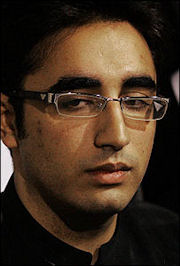Posted December 31, 2007
By Farooq Tariq
The appointment of Benazir Bhutto’s son, 19-year-old Bilawal Bhutto Zardari, as the new chair of Pakistan Peoples Party is an attempt to keep the feudal traditions of politics alive in South Asia. The PPP Central Executive Committee unanimously approved the appointment of Bilawal Asif Zardari, in its 30th December meeting at Nuedero Sind.
According to Benazir Bhutto’s will, read out in the meeting, Asif Zardari, her husband, was to be appointed as PPP chair in her absence. However, Asif Zardari suggested his son as the new chair.

A student of Oxford University, Bilawal Bhutto Zardari is the eldest, and only, son of Benazir Bhutto’s three children. Born in Pakistan, he never lived here after he went to school.
Asif Zardai will be the PPP’s co-chair. Thus the PPP is effectively again under the Bhutto family’s total control.
The PPP leadership has retained the same feudal traditions over the last 40 years of existence. After Zulfiqar Ali Bhutto was hanged on 4 July 1979, his wife, Begum Nusrat Bhutto, took over. When Begum Bhutto wanted her son, Murtaza Bhutto, to take over in 1996, she was deposed by Benazir Bhutto, who became the life-long PPP chair. In September 1996, while Benazir Bhutto was still prime minister, Murtaza Bhutto was killed in a police encounter. Benazir Bhutto lost power a month later.
Rejecting the government version of the assassination, the PPP Executive Committee Meeting also decided to take part in the general election of 8 January 2008. This decision was reached despite a massive movement against the General Musharraf’s military dictatorship. All over Pakistan, hundreds of thousands have demonstrated against the regime and all the banners and flags of the ruling Muslim League were torn apart. The movement forced the Muslim League (supporting Musharraf) into hiding.
At this moment, had the PPP leadership announced a boycott of the general elections and launched a movement to overthrow the military dictatorship the regime would have forced the regime to resign. Instead, the PPP leadership played on massive sympathy to build itself through elections to be held under the Musharraf regime. With this decision, the PPP leadership has led slip a precious moment of history, when a powerful mass movement could have gotten rid of the military’s intervention.
With the appointment of Bilwal Bhutto, the PPP leadership refused to break with feudal tradition. It has retained the undemocratic tradition of a few families controlling politics. The hereditary hegemony of politics has been preserved, thus strengthening feudalism.
